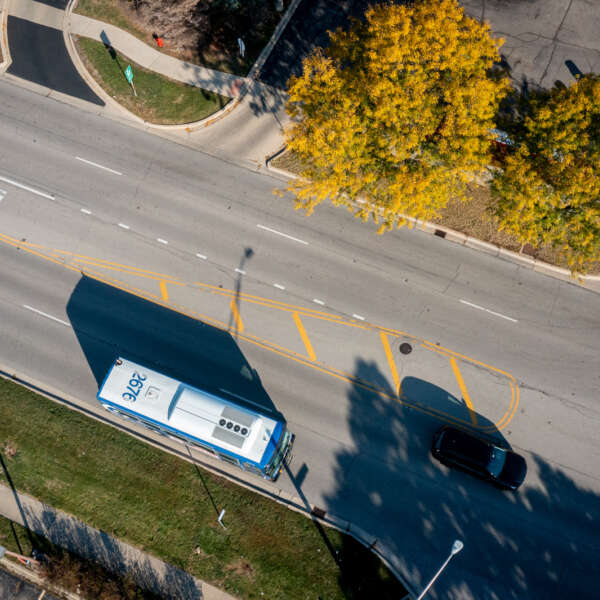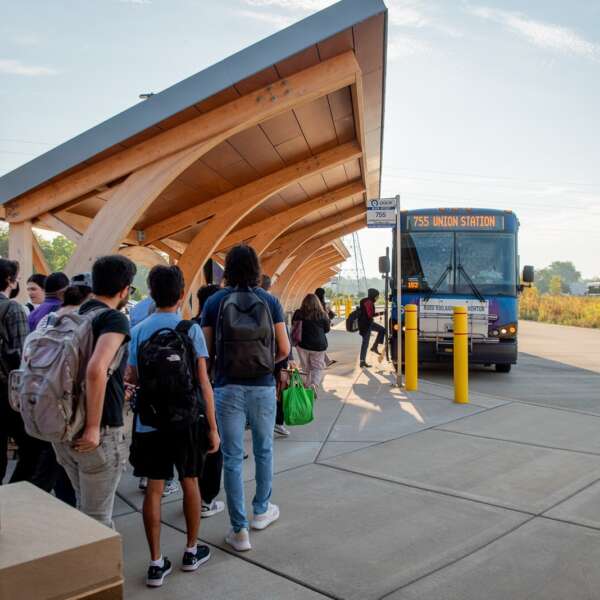State hearings show broad support for funding transit and increasing service across region
November 21, 2024
November 21, 2024

Lawmakers, local leaders, and transit stakeholders from throughout the region recognize the extraordinary value of the transit system and the need for sustainable funding. At six Illinois Senate hearings held in the summer and fall of 2024 throughout the RTA region and in Springfield, agency leaders, riders, and advocates testified on how transit supports the economy, mobility independence, community quality of life, public health, and the region’s environmental wellbeing—and local leaders advocated for service to be expanded to multiply the benefits in each of these areas.
The Illinois House also announced the formation of its Public Transit Working Group, which now meets regularly with transit stakeholders. The RTA continues to advocate for sustainable operations funding and strategic reform to improve accountability and service for riders and taxpayers. A funding solution to the impending fiscal cliff is necessary by the end of the Spring 2025 legislative session to avoid devastating cuts for the region’s transit system.
The RTA is advocating for reforms that would establish a stronger RTA that improves service and accountability for riders and taxpayers. This requires granting the agency more and clearer authority in key areas such as service standards, fare policy, and capital project prioritization, and mechanisms to monitor and enforce compliance from the Service Boards. These are areas featured in the RTA’s Transit is the Answer strategic plan and CMAP’s Plan of Action for Regional Transit (PART). Transit stakeholders voiced support for these reforms at the hearings, viewing a strengthened RTA as capable of addressing the system’s core challenges while preserving the operational expertise and local input at the Service Boards.
At each of the hearings, leaders agreed that additional operations funding is needed and were interested in understanding the improvements in transit service that additional investments would deliver. Lawmakers and stakeholders discussed both governance reform options featured in PART: (1) fully consolidating the RTA, CTA, Metra, and Pace into a new Metropolitan Mobility Authority (MMA)—a single mega-agency that oversees operations, planning, finances, and capital improvements— and (2) strengthening the RTA to oversee regional planning and policy while allowing the Service Boards to focus exclusively on delivering high-quality service.
Some stakeholders made the case for a fully consolidated MMA, saying a single agency is needed to improve coordination and accountability. Others raised concerns that full consolidation would eliminate regional decision-making processes and diminish regionwide representation on the new board. They noted a lack of clarity on the complex, resource-intensive steps that would need to be taken for full consolidation, including the transition of debt and assets, bonding authority, staffing, contracts, and pension obligations, among other critical areas.
Overhauling the entire system under a new agency is estimated to take up to four years to fully implement, at a time when the agencies need to focus on navigating a financial crisis and using any new funding to deliver more frequent and reliable service.
While the conversation on reforms continues, the funding challenges facing the region’s transit system remain largely unaddressed. Stakeholders have stated that any funding package should allow for increased levels of service, but which revenue sources are amended or introduced to support that goal remain unclear at this time. No single revenue source can fully address the 20% operating budget gap on its own. A diversity of sources is key, and revenue sources should be stable, durable, and expected to grow over time. Both the RTA’s Transit is the Answer and CMAP’s PART identify the need to fully fund free and reduced fare programs, as well as ADA paratransit, and explore other revenue options to support transit operations at this critical time.
Due to the timing of the state’s budget cycle, federal requirements, and other factors, urgent action is needed this spring to avoid drastic service cuts. In August, the RTA released an economic impact analysis illustrating two drastically different potential futures for the regional transit system. The results of this analysis are clear: not investing in transit comes with costs greater than the fiscal cliff itself, and these costs grow each year as the problem magnifies. Conversely, a robust investment in transit operations will accelerate equitable economic growth and bring financial returns to the region, paying off the investment quickly.
Other states have already acted on this issue, ranging from temporary, stop-gap measures that leave transit systems in peril, to long-term, sustainable solutions to meet the needs of riders well into the future. Just like waiting too long to act would exacerbate the funding crisis, enacting only short-term or inadequate solutions by spring 2025 would result in prolonged uncertainty and, potentially, even worse service cuts and fare increases in the long run.
The RTA is working with policy makers at all levels of government to develop sustainable funding solutions and improve the system for all riders. Join the Transit is the Answer Coalition to help bring about the legislative changes needed to support transit at this pivotal moment.
Subscribe to our Newsletter
Related Articles
 Coalition members provide feedback on ‘Transforming Transit,’ RTA’s vision for improved service and accountability
Coalition members provide feedback on ‘Transforming Transit,’ RTA’s vision for improved service and accountability
Nearly 200 riders, advocates, and other stakeholders met virtually with the RTA on February 11 for the sixth quarterly Transit is the Answer Coalition meetin...
February 20, 2025 Far South Halsted Corridor Study prepares for future Pace Pulse service
Far South Halsted Corridor Study prepares for future Pace Pulse service
An RTA Community Planning project kicked off in late 2023 as a crucial step in bringing Pace Pulse service to Chicago’s south suburbs. The Far South Halsted ...
February 19, 2025 RTA proposes reforms to prioritize capital projects, maximizing impact of funding
RTA proposes reforms to prioritize capital projects, maximizing impact of funding
RTA is proposing a historic restructuring of the region’s transit governance to maximize the impact of new operating funding and ensure all riders experience...
February 5, 2025 RTA proposes reforms to integrate fares, require accountability for faster and more reliable transit
RTA proposes reforms to integrate fares, require accountability for faster and more reliable transit
RTA is proposing a historic restructuring of the region’s transit governance to maximize the impact of any new operating funding and ensure all riders experi...
February 5, 2025 For the third year in a row, regional transit ridership was up by double-digits in 2024
For the third year in a row, regional transit ridership was up by double-digits in 2024
Ridership across the Chicago region’s transit system continued to increase throughout 2024, according to the latest data from CTA, Metra, and Pace. The regio...
January 28, 2025 RTA is seeking $1.5 billion in annual operating funding. What would that mean for your commute?
RTA is seeking $1.5 billion in annual operating funding. What would that mean for your commute?
On January 15, RTA released Transforming Transit, a vision for the regional transit system with $1.5 billion in annual operating funding supported by a stron...
January 28, 2025